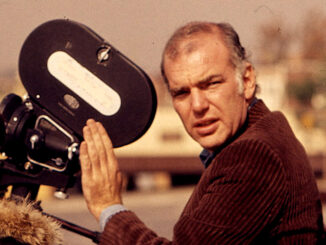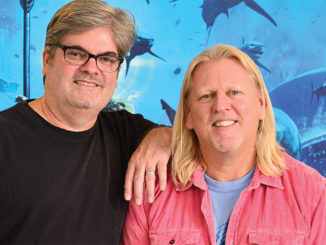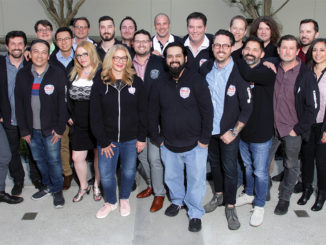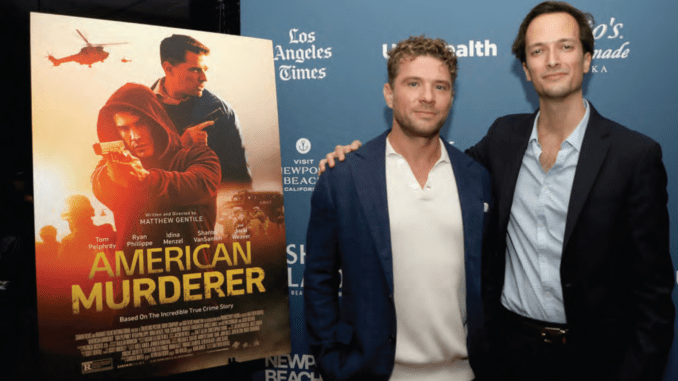
In the depth of the pandemic, the director of ‘American Murderer’ found his perfect editor. ‘You hire the right person for the job.’
By Rob Feld
Matt Allen and Matthew Gentile were separated by a few years while attending American Film Institute, but the two came together to collaborate on their first feature film, “American Murderer.”
Gentile is a director who was finally given the opportunity to make his first commercial film on a budget that has a few zeros behind it. Sticking with a less experienced editor might be a gutsy move, but it speaks to the depth of collaboration and trust that can develop between a director and editor. Allen and Gentile developed a creative partnership during the pandemic lockdown, when Allen offered to help create previsualizations of “American Murderer” set pieces during the film’s development.
“American Murderer” tells the true crime story of Jason Derek Brown (Tom Pelphrey), a classic con man swindling his way through a life of debauched luxury. The walls start to close in, though, when he falls behind on gambling debts to a violent group and, in his coke-addled desperation, robs and murders an armored truck driver. FBI Special Agent Lance Leising (Ryan Phillippe) takes up the investigation, and the film, told in non-linear fashion, brings its audience forward and back through time, giving us glimpses of Brown’s childhood and the people he betrays in adulthood, until he goes on the run and disappears, like his father did before him.
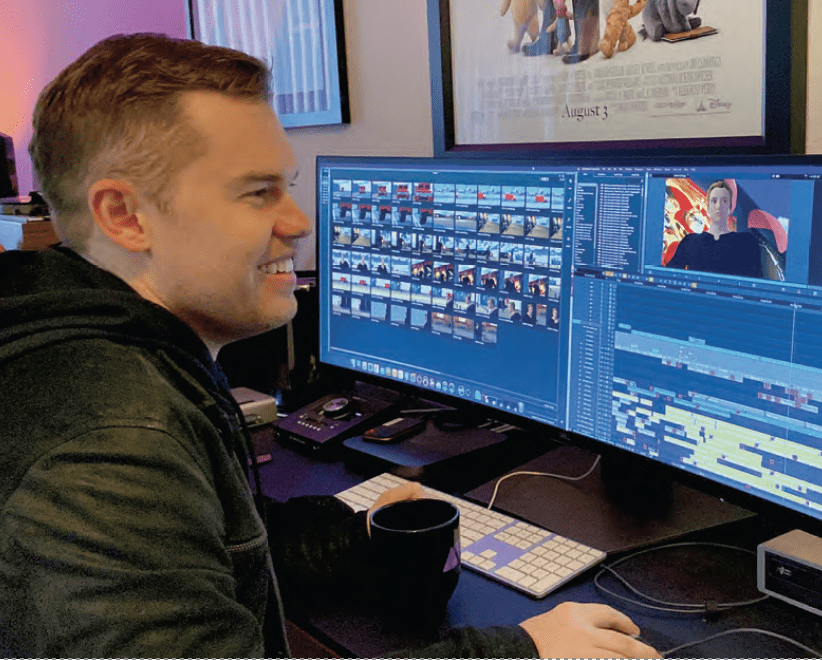
As Allen and Gentile tell it, the trust they built over time, and Allen’s gumption to do some off-road concepting on his own, made a significant impact on the third act in particular. It was the one section of the film where Allen was feeling a lack of suspense. Though Brown was on the run, a dramatic climax was missing. Allen had an idea but to sell it, he knew he would need to show rather than tell.
CineMontage: Matt, you came up through the studio system. What’s the best lesson you took from a mentor?
Matthew Allen: Editor Matt Chessé would always tell me, “Keep the drama on the screen. You need to handle the politics all around you well and be solid for the director and producers, and deliver the movie on time. You must be a mediator and a problem solver.” He would also say, “They only see what you show them. There may be parts of the dailies that don’t tell the story well, but at the end of the day, they only see what you show them in the timeline.”
CineMontage: Matthew, it’s hard enough getting your first feature made. What was it about your relationship with Matt that gave you the confidence to hire him for what would also be his first feature?
Matthew Gentile: I’ve seen producers say to directors before me, “I know you like your film school friends, but we can give you someone more experienced.” I noticed that most people who took that deal left the process thinking their movie got taken away from them a little bit. You hire the right person for the job. I came to know that was Matt, because we were friends for a while, we talked a lot about film, and in the year leading up to production, he offered to previsualize scenes together with the software he won as part of his ACE Eric Zumbrunnen Fellowship. I told him I had bosses and didn’t know if I could ultimately give him the editing gig, but he said, “We’re stuck in COVID with nothing to do, let’s just try it.” He would build a set in 3D, we would take my shot list and roam a camera through. Really, he got me directing again. You come from film school where you made six shorts, all ready to go. But then development happens, years pass, and you feel like you’re forgetting how to block actors. So Matt got me back in the chair and we discovered how well we worked together. Then it became me saying, “I have to get you on this movie.” I was very lucky.
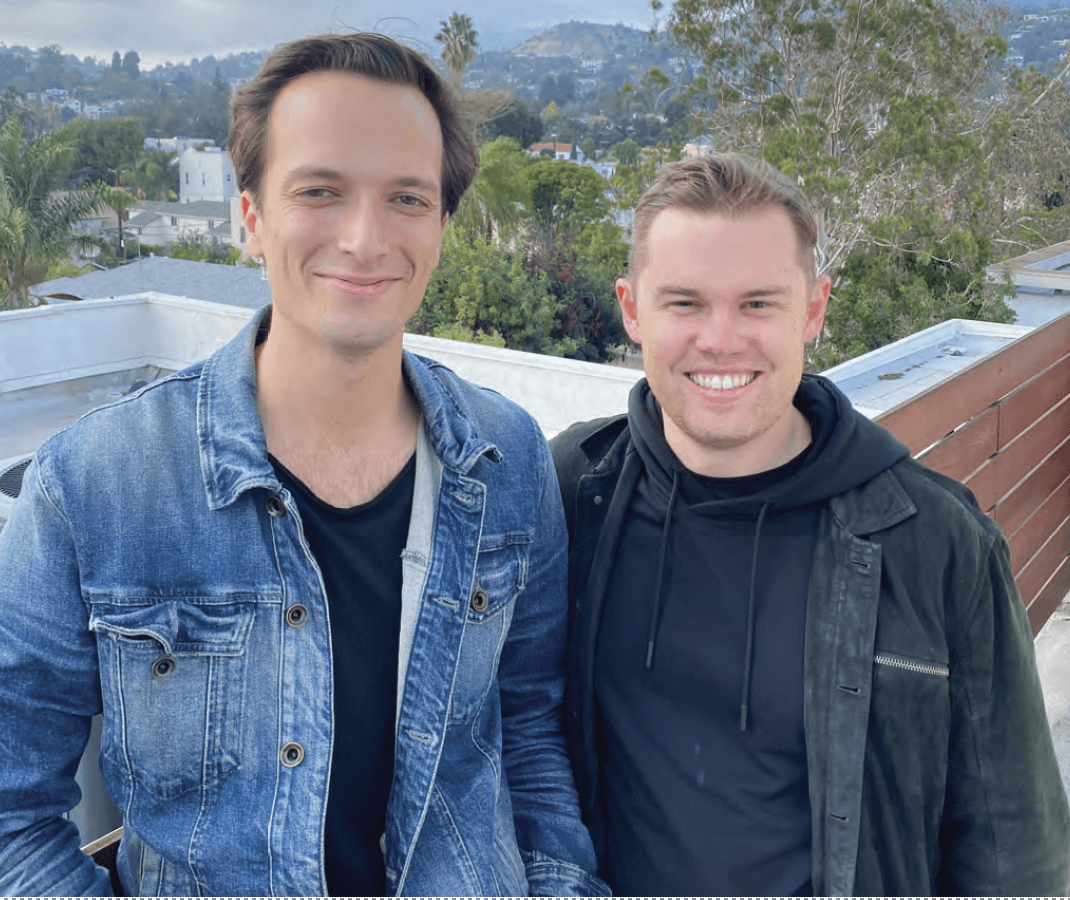
CineMontage: Did you find the previz useful by the time you were actually shooting and cutting?
Allen: For me, the process was really helpful. It got Matthew and me working together without the clock running. It’s one thing to watch movies together, have a beer together, but let’s see us in a room for 10 hours cutting scenes and doing virtual camera moves. There was a lot of synergy there. I also got a lot of insight into what Matthew was planning. He might come in with a list of 20 shots but then see we could cut seven of them. That was helpful for me to get into his brain and see what Matthew Gentile likes and what he’s looking for. You still have a lot of work to do with a director after you put together a first cut of a film, but it helped me get on the same page with him more quickly. I put the previz aside and didn’t look at it again, figuring I’ll just work with whatever he shoots on the day. I actually went back to it recently and realized that many of the core camera moves we planned are actually in the movie.
Gentile: Working on a budget, we found that the previz for anything complex was very helpful. You want to know your shots for a boat party because you’re going to be on the water, and you’re not going to be able to do it forever. There’s a lot of geography to keep track of in an armored truck robbery or a SWAT invasion. We had a couple of days where it was two cameras shooting, and one day to get each scene. The previz allowed me to know exactly what beats I needed and how to establish geography. Then it gave me the space to be flexible on the day.
Allen: Part of the collaboration with Matthew is “be prepared but be flexible.” Matthew had a strong vision but allowed me to try things. One example of that great collaboration was when we needed a little bit more of a spike towards the end of the film, so we took some creative license when Jason is on the run. The individual scenes were working well as scripted, but we realized we could scramble them up and have things happen simultaneously. When they were intercut, it added more dimension and emotion to what was happening. We called it “the third act scramble.” We also wanted to go a little bigger and better with a chase sequence, so we were able to do a bit of previz before Matthew went back out for pickups and got the shots to create a full chase with vehicles.
Gentile: He’s being overly modest. It was his idea. It was a non-linear film, but the third act in the script was linear. There was no real chase, and Matt realized we needed something there. So he got stock footage from other movies and engineered a chase for me to see. Then I said, “Oh.” So in a way, he wrote that with stock shots, which to me is part of the power of editing; you can discover these things later. Everyone knows I wrote and directed the movie, so I’m not afraid to say that Matt works as a co-director and a co-writer, just like the actors do when you work together.
CineMontage: I hear so many similar anecdotes from successful editors—going that extra mile to try out an idea that could flop or it can really pay off. For some, it even started a career.
Allen: I think two things allowed me to be in that space. One was working under really great editors like Matt Chessé and to be mentored by others like Kevin Tent and Alan Baumgarten through the ACE Eric Zumbrunnen Fellowship. You stand on the shoulders of giants — the filmmakers who have come before you — and you watch, learn and listen on how they went the extra mile. The second thing was having a director who was open to you saying, “Hey, this might be awful, but for your eyes only, let me know what you think.” That creates a safe space where they can either love it or hate it without a bunch of other people watching. Those intimate moments of having an edit come together and fulfill a director’s vision are some of my favorite things about editing.
Gentile: Hiring Matt Allen makes me look good. He’s going to push you to be better. He will tell me if I have something stuck in my teeth. You need that in a collaborator. You need people who are going to rein you in and tell you if it isn’t working. It’s all a constant conversation.



